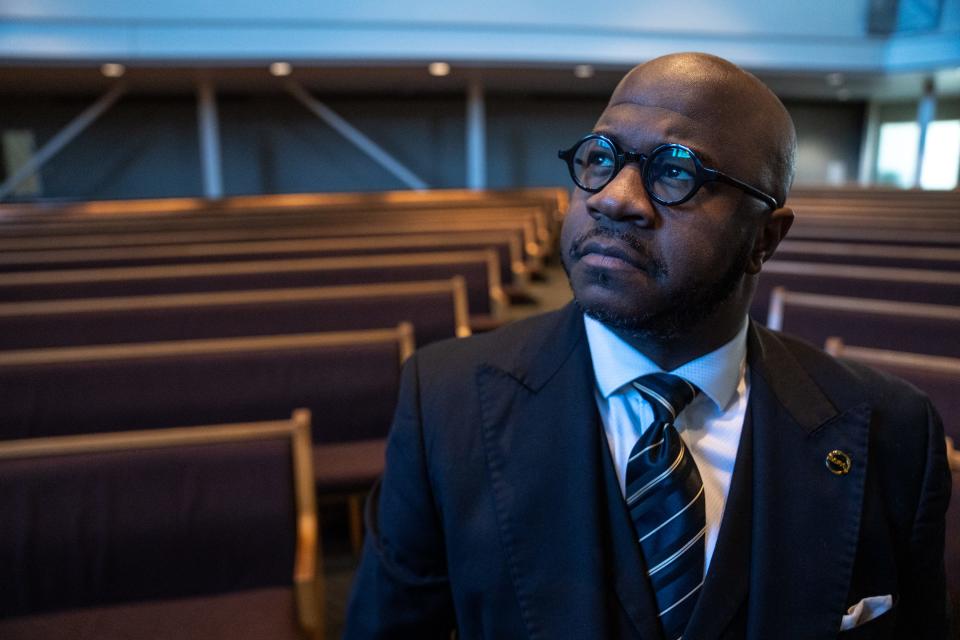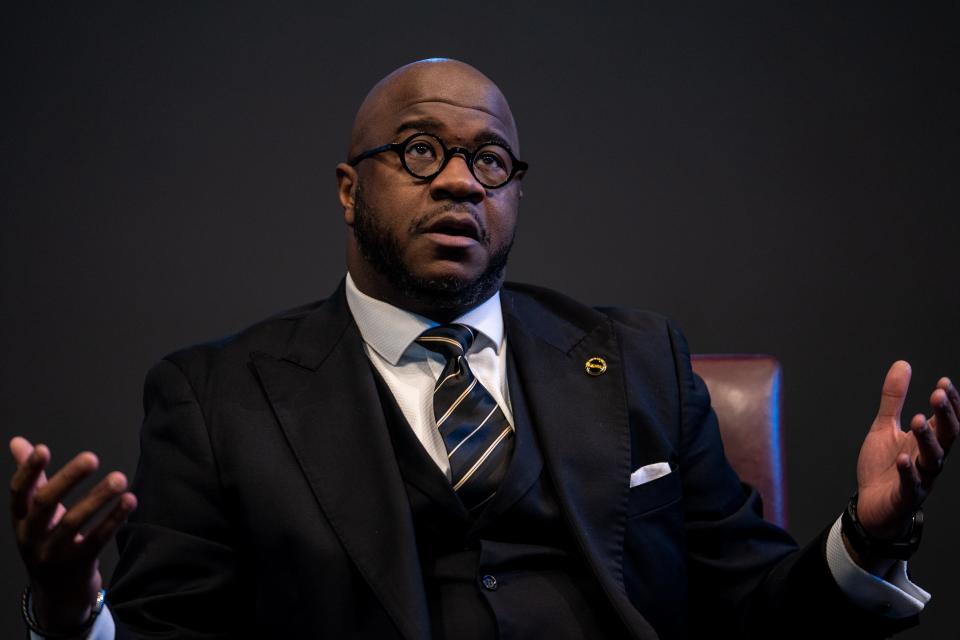Martin Luther King's legacy continues shining through Phoenix churches and leaders
- Oops!Something went wrong.Please try again later.
Fifty-five years after Martin Luther King's death, African Americans continue to proudly honor his reformative legacy in Phoenix.
A weekend of events celebrated King's legacy and allowed leaders in religion, government and education to bring awareness of how the Black community in the heart of Phoenix has anchored itself as part of the city's history and triumphed against discrimination.
"It was a historic black neighborhood where under segregation, black people were forced to live. You know before the 60', they weren't allowed to live north of Thomas Road," said First Institutional Baptist Church Pastor Warren H. Stewart Sr.
How Phoenix churches provided a starting place for Arizona's civil rights movement
The Eastlake neighborhood located near 16th and Jefferson streets was historically known as a Black neighborhood — home to trailblazer Calvin C. Goode and some of the oldest Baptist churches in the Valley.
"That area was not only the epicenter of the black community but was the epicenter of the King movement," said Matthew Whitaker, executive director of the George Washington Carver Museum and Cultural Center in Phoenix.
Three churches in the area of the neighborhood — First Pilgrim Baptist Church, First Institutional Baptist Church and Historic Tanner Chapel African Methodist Episcopal Church — were all within a one-mile radius of each other in the Eastlake neighborhood.
For many religious leaders of the Black community, reflecting on the past made it apparent that Black people in America continued to fight for equality.
First Institutional Pastor Stewart was critical to the campaign to make MLK day a statewide holiday in Arizona. The pursuit became an infamous fight that was won by King supporters in 1988.
"I watched Dr. King deliver his message from the steps of the Lincoln Memorial when I was 11 years old from my hometown of Coffeeville, Kansas," said Stewart.
King was a role model and mentor ever since Stewart's journey in seminary school. He moved to Arizona in 1977, bringing with him King's values of a nonviolent fight for human and civil rights.
A place of 'peace': The civil rights history of the oldest park in Phoenix
Even though Stewart has been on his journey of equality for nearly 50 years, he believes there is still much more work to be done for African Americans nationwide.
"We're still fighting to be included, and that's really unfortunate in the 21st Century," said Stewart.
Stewart cited an example of this exclusivity happening as recently as last week, where at mental health conference he was attending, Stewart was astonished to see the lack of African-American communities represented in the event materials.
Stewart took this upon the organizers of the event who expressed that the lack of African American inclusion was unintentional. Stewart noted that was the problem, the organizers had not thought about it.
The Eastlake neighborhood where Stewart's church is located, was beginning to become part of more widespread gentrification noticed by both Stewart, and Terry E. Mackey of Pilgrim Rest, a community of around 4,000 parishioners.
"I don't know that I have 10 members who could walk to church," said Stewart.
"It's driven by capitalism, people trying to make the most money," added Stewart.
But people like Stewart and others at the neighboring congregation Pilgrim Rest Baptist Church remain community leaders and role models for Phoenix's contemporary African-American community.

How MLK became the role model for Arizona's leadership in the Black community
"Preaching at 13 years of age, I remember the first time I really can recall seeing Dr. King. I always saw Reverend Dr. Martin Luther King Jr. 'I thought a doctor?' I thought that he was not only a preacher but a medical doctor to be called reverend doctor, only to find out that he had a doctorate in religion and philosophy," said Mackey, pastor of Pilgrim Rest Baptist Church.
"I always said to myself as a young man, I said if I ever became a reverend, I would want to also be a reverend doctor like Martin Luther King Jr.," added Mackey.
Mackey received his doctorate in 2022 from the Memphis Theological Seminary, which was a homecoming event for the Tennessee-native pastor. He was honored at the event by his father, the pastor of Lily of the Valley Church where Mackey got his start.
Now entering his sixth year at Pilgrim Rest, Mackey was preparing to honor King's legacy at the Friday morning Livin' The Dream Award ceremony, a candlelight event on Sunday, and a Monday march that leads the community from Pilgrim Rest to Margret T. Hance Park three miles away.
At Pilgrim Rest church, a new pastor steps out, in the shadow of a legend
Mackey said that King's legacy was a model the church could continue to use, but it required an integral hands-on commitment.
"I'm a firm believer that a shepherd ought to smell like sheep," Mackey said. "If a shepherd is going to smell like sheep, we have to spend time with the sheep, care for the sheep, give attention to the sheep."
"We don't want our churches to just be images of frozen success," said Mackey.
Mackey described King as a "transformational pastor," who developed a new role he hoped to replicate at Pilgrim Rest.
Ron Williams has been the executive chair of the Arizona MLK Celebration Committee for 10 years and has planned MLK events for 22 years. He said Mackey is his "Memphis Tennessee brother," over the two's connection to the city that they both came from.

"That relationship has been long-standing, as a matter of fact, Pastor Mackey indicated to us that as long as he is pastor, we can count on them (Pilgrim Rest) for the march," said Ron Williams of the Arizona MLK Celebration Committee.
Emmett Boyd is a Pilgrim Rest parishioner and one of the event coordinators for the Arizona MLK Celebration Committee. Mackey reflected on his efforts during his interview with The Arizona Republic.
"I can see where he sits," laughed Mackey, as he pointed to one of the sea of empty pews at Pilgrim Rest's location off Jefferson Street.
"MLK is one of my heroes," said Boyd. He said that he and Mackey continue to be proponents of King's vision for a future where all rights and privileges are equal for everyone.
"I look MLK's importance to the quality of life, because I have relatives that grew up in slavery," Boyd said. "They talked about not being able to vote in different things like that. When you hear those things as a child, you're sitting there, you don't really understand them. But as you get older, those things become important to you with regard to everybody."
The march has its roots in helping Arizona's to gain recognition for the MLK holiday
Mackey planned to join members of the Arizona MLK Celebration Committee, Arizona Opportunities Industrialization Center, church leaders and a diverse group of community members at Monday's march.
The march reminds the community that they can now march without the sole intention of fighting for the right in the first place.
Stewart said that while the march has always departed from the neighboring church, Pilgrim Rest, it has not always traveled to Margaret T. Hance Park.
Originally marchers traveled to the Arizona state Capitol, where Stewart said upward of 10,000 people joined together to fight for the MLK holiday.
The march now ends at Margaret Hance Park instead of the capitol to accommodate a celebratory festival that brings together attendees and wraps up the festivities honoring King.
March coordinator Marquis Scott, who is a member of Pilgrim Rest church, said the event offered an opportunity to reflect on King's original march in the 1950s.
"Change upsets people from time to time because of a lack of understanding," said Scott, reflecting on why he believes the march is an educational platform.
Honoring Martin Luther King Jr.: Arizona was a holdout. Here's what it cost the state 30 years ago
MLK honored at award ceremony honoring Valley culture and diversity
The people honored at the 2024 Livin The Dream Awards on Friday morning all had one thing in common: they carried on the legacy of MLK through their commitment to service of the community.
The event was attended by Arizona Gov. Katie Hobbs and Phoenix Mayor Kate Gallegos.
As a choir sang "We've Come This Far by Faith," the breakfast and award ceremony honored Arizona's own who made an impact in their community while carrying on King's legacy, all while honoring the next generation as a group of young people entered the hall with a burning torch.
The event master of ceremonies was Ron Williams, the event chair of the MLK celebration committee who introduced a selection of interfaith community leaders to present a prayer from each of them.
The leaders said the spirit of King and his legacy motivated them to embark on a journey to make the world a better place.
The first prayer was given by Jewish Rabbi Robert L. Kravitz, who said African Americans and Jews have suffered indiscriminately at the hands of segregationists in history.
"Dr. King continues our common fight against these deadly enemies of democracy," said Kravitz, who ended his speech by projecting the three-part loud call of a Shofar made from a ram's horn.
The next prayer was given by Lolita Ahmed-Waters of the Buddhist community.
Water said King's words of "injustice anywhere is a threat to justice anywhere," provided a direction for her and the Buddhist community in Arizona.
"Let's all join together and keep fighting the good fight," said Waters.
John Akram who represented the Islam community gave a prayer in both Arabic an English.
"Islam as well as all the other faiths that we have the privilege of being able to openly and freely practice in this country in this nation. Dr. King set the stage for us to be able to practice and be able to enjoy it was a religious community without any discrimination, without any degradation or any harm," said Akram.
Gerrit Steenblik, who represented the Church of Jesus Christ of Latter-day Saints, honored MLK's legacy by inviting everyone to join hands in prayer.
"We rejoice to be together as we remember a martyr, a real-life hero of our own generation. Reverend Dr. Martin Luther King Jr. At the same time even this morning we witnessed terror and turbulence at home and abroad. Surely the heavens must weep," said Steenblik.
Pilgrim Rest's own Pastor Mackey gave the final prayer before the awardees were announced. In it, he invoked King's resounding legacy.
"Albeit not a long life, it was a strong life," said Mackey of King. "By your help, he was able to subpoena the consciousness of this nation," added Mackey.
This article originally appeared on Arizona Republic: Martin Luther King's legacy continues shining in Phoenix. Here's how

